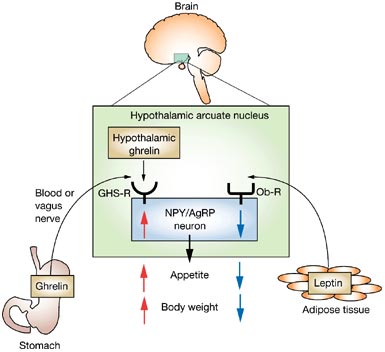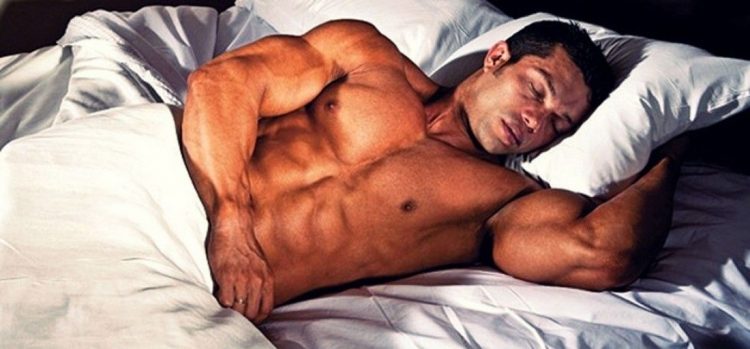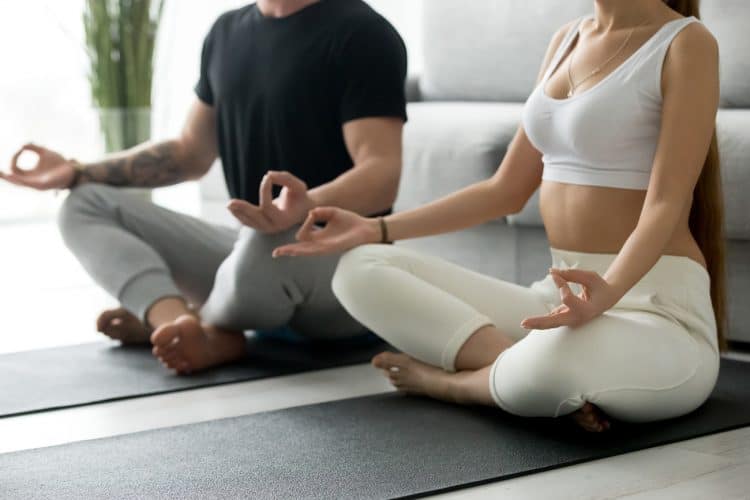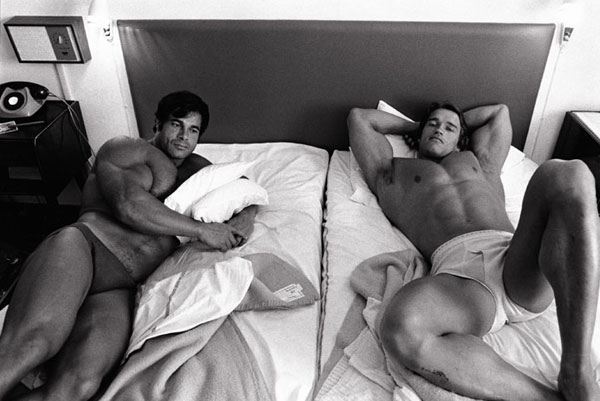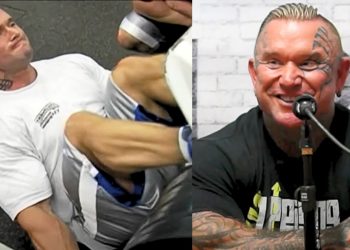Modern life is hectic, and most people are under constant pressure to do more, achieve more, and perform better than ever before. Because of this, a lot of us start our days early and go to bed late to make the most of the time available. After all, there ARE only 24 hours in a day!
Statistics suggest that adults are getting by on less sleep than ever before, and that’s a problem (1). Long-term sleep deprivation can have a significant impact on your health, leading to issues like increased inflammation and decreased immunity, and is linked to several serious disease and medical conditions, including (2):
- Obesity
- Type II diabetes
- Cardiovascular disease
- Anxiety and depression
- Alcohol and drug abuse
- Increased disease mortality – the chances of dying instead of recovering from illness
In addition, not getting enough sleep can make building muscle and losing fat harder. How? Here’s how!
Sleep Deprivation and Muscle Building
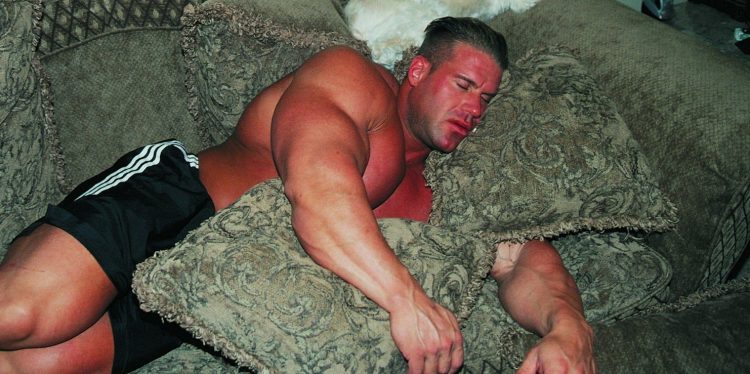
As every bodybuilder knows, to trigger hypertrophy or muscle growth, you need to train hard and consistently and eat the right foods in the proper quantities. But, even if you pay your dues in the gym and at the dining table, you could still be undermining your progress if you aren’t getting enough sleep (3). Studies suggest that lack of sleep will:
Decrease testosterone – this anabolic hormone plays a critical role in muscle growth. It’s also a fat burner and has a part to play in motivation and determination too. Testosterone also affects sex drive, which, while not directly linked to hypertrophy, is still something most of us want to avoid!
Decreased human growth hormone and insulin-like growth factor – both HGH and IGF-1 are highly anabolic, which means they are involved in the process of protein synthesis and muscle repair and growth. Too little of these important hormones means slower recovery after exercise and less progress between workouts. HGH is also a potent fat burner.
Increase cortisol – cortisol is a catabolic hormone produced in response to stress. Lack of sleep is a source of stress, which is what triggers an increase in cortisol levels. Catabolism is the breakdown of muscle tissue, and while a little catabolism is unavoidable and even necessary to trigger hypertrophy, chronic elevation of cortisol can stop your gains in their tracks. Plus, cortisol also primes your body for fat storage rather than fat burning.
Increase inflammation – muscle and joint pain are a common and sometimes unavoidable part of intense strength training. But it should always be manageable and not overly severe. Lack of sleep can lead to increased inflammation, making minor aches and pains much more serious. Increased inflammation can also impair muscle growth and recovery and could even increase your risk of injury.

Reduce training motivation – if you are chronically tired, the last thing you’ll probably feel like doing is hitting the gym. A pre-workout supplement can give you a temporary boost, but these products only really treat the symptom of chronic tiredness and not the cause. If you need to take a shot of pre-workout before every workout, you probably need to get more sleep.
Sleep Deprivation and Fat Burning
Too little sleep won’t just impede your efforts to get swole, it could also make getting lean harder and could even lead to fat gain (4). Not getting enough sleep has been linked to:
Increased hunger – lack of sleep reduces your energy levels. In an effort to get energy from an alternative source, your body will increase hunger. This often manifests as cravings for fast-acting carbs and sugar. While you might be able to resist increased hunger and cravings for a while, eventually, they’ll wear your willpower down, and you’ll give in. If you constantly cheat on your diet, lack of sleep could be the culprit.
Reduced leptin and increased ghrelin levels – leptin is a hormone produced by your stomach that lets your brain know you are full. Because of this, it’s known as the satiety hormone. In contrast, the hormone ghrelin is responsible for stimulating your appetite. Low levels of leptin and increased levels of ghrelin create a perfect storm for hunger and overeating.
Less willpower – you are more likely to make unhealthy food choices when you are tired. Everything feels harder when you are sleep deprived, including choosing or making healthy food. Your ability to resist temptation will also decrease.
Increased insulin resistance – ideally, the food you eat should end up in your muscles and not your fat stores. But, when you are sleep deprived, insulin resistance increases, which impairs proper nutrient partitioning. In short, the food you eat is more likely to end up being converted to and stored as fat when you don’t get enough sleep.
How Much Sleep do You Really Need, and How to Get More?
Bad news; there is no one size fits all recommendation for how much sleep you need. The ideal amount depends on things like your age, stress levels, health, and nutritional status, and genetics may play a part too. But, for most of us, somewhere between 7-9 hours per night seems about right (5).
While you CAN get by on less, that doesn’t mean you should, and, as you now know, chronic and even short-term sleep deprivation can have a significant impact on your health, performance, and physique.
Unfortunately, what should be an easy and pleasurable activity can be challenging to fit into a modern, high-pressure lifestyle. And, a lot of people are simply “bad sleepers” who find it difficult to get to sleep or stay asleep.
If you always feel tired, are struggling to gain muscle, have no energy, are overly reliant on caffeine or pre-workouts, gain weight easily, or just feel “bleugh” much of the time, you probably need to get more sleep.
Here are 7 tips for increasing sleep quality and duration.
1. Bring Back Bedtime
It’s probably been years, if not decades since you had a bedtime, but if you are struggling to get the recommended 7-9 hours of sleep per night, it’s time to reinstate this childhood habit.
Work back 7-9 hours from the time you need to get up. That’s your new bedtime. So, if you need to get up at six and want to get eight hours of sleep, you need to be in bed by 10 pm. That means you are in bed with the lights off at ten, and not just starting your pre-bed routine.
2. Create a Pre-sleep Routine
Your pre-sleep routine should start 30-60 minutes before bedtime. The idea is that, when your bedtime arrives, you are relaxed and ready to switch off the lights and drift away to dreamland. Ideally, your pre-sleep routine should be the same each and every night. This will help establish and reinforce healthy sleeping habits.
You’ll need to create your own pre-sleep routine, but it could end up looking something like this.
Starting 45 minutes before bedtime:
- Turn off the TV, put down your tablet, and set your phone to do not disturb
- Drink some warm milk or chamomile tea
- Take a warm shower
- Brush your teeth
- Get into bed
- Read a book (not your social media feed!)
- Do some slow breathing exercises or meditate
- Turn the lights off and sleep
3. Try Some Breathing Exercises
Breathing exercises are a form of meditation. They force you to concentrate on just one thing and help quieten your mind. This helps block out the thoughts that could otherwise stop you from falling asleep.
There are several different breathing exercises you can do, and they’re all similarly effective. Three good ones to try are:
Equal breathing
Equal breathing is actually a yoga exercise called Sama Vritti in Sanskrit. It’s very simple, but that doesn’t mean it doesn’t work.
Lie down in a comfortable position with the lights off; dressed and ready for bed. Get under the covers so that you won’t have to wake yourself up as you drift off. Inhale for a slow count of four and exhale for a slow count of four. Focus your mind on the rhythm of your breath. Continue breathing this way for as long as it takes to start feeling drowsy.
If your mind wanders, just gently bring it back to your breathing. Once you feel comfortable with four-count breathing, try 6-8 counts. Deeper breaths are more relaxing.
Abdominal breathing
When you are stressed and anxious, you tend to breathe into your chest. This perpetuates those feelings of stress and can stop you from falling asleep. In contrast, breathing into your abdomen is relaxing and can help lower your stress levels.
Lie on your back with one hand gently resting on your chest and the other hand on your abdomen. Breathe normally and notice which hand rises the most. It’ll probably be the one resting on your chest.
Shift your breath to your abdomen so that only your lower hand moves. This means you are using your diaphragm and not your chest muscles to breathe. Breathe slowly and deeply, but don’t force it. You can also combine this exercise with the one above.
4-7-8 breathing
This popular breathing exercise is also one of the most effective. It takes a little practice, but many users report that it helps them fall asleep, both reliably and quickly.
Lie in a comfortable position. Inhale through your nose for a slow count of four, hold your breath for seven counts, and then exhale fully for eight counts. Keep running through this cycle until you start to feel drowsy.
4. Dim The Lights
Before the invention of the electric lightbulb, humans tended to be active when it was light and sleep when it was dark. This wake/sleep cycle is controlled by something called the circadian rhythm.
Exposure to bright lights can disrupt your circadian rhythm, and that means a lot of people don’t feel tired even though it’s nighttime and time to sleep.
Get your natural wake/sleep cycle back on track by dimming the lights in the run-up to bedtime. Also, avoid brightly lit screens (tablet, phone, TV) as these devices emit something called blue light, which is thought to be especially disruptive.
Reinforce your circadian rhythm by exposing yourself to bright and preferably natural light soon after waking in the morning.
5. Have a Caffeine Curfew
Caffeine is a potent and popular stimulant. It gives you energy and is even a useful fat burner. But, it can also make it harder to fall and stay asleep. The effects of caffeine are quite long-lasting, and that after dinner espresso could be the reason that you’re still wide awake at midnight.
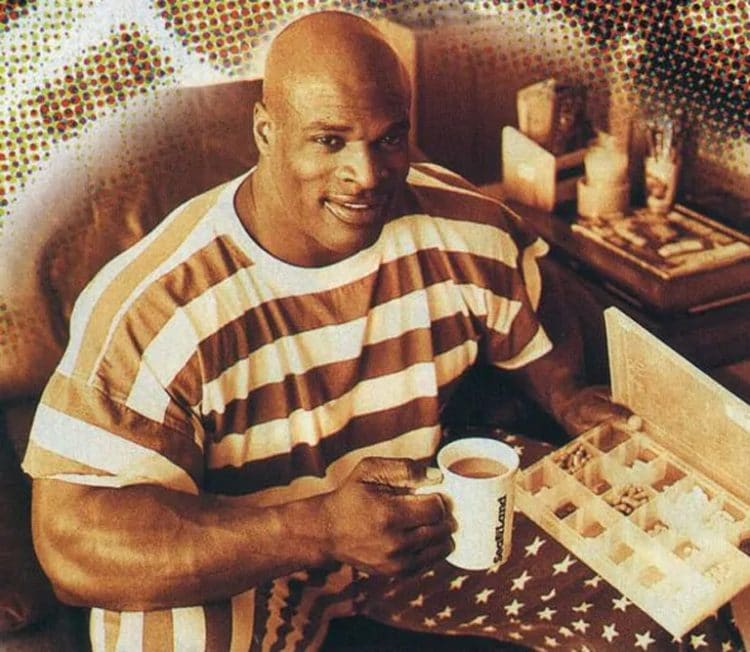
You don’t need to give up caffeine to get a good nights’ sleep, but you do need to stop using it several hours before bedtime to ensure that you can get to sleep on time. Sources of caffeine include chocolate, coffee, tea, energy drinks, and pre-workout supplements. Limit your caffeine intake after midday and cut it out entirely 4-6 hours before bedtime.
6. Create The Perfect Sleep Sanctuary
If your bedroom is too brightly lit, your bed is uncomfortable, or you are too hot or too cold, you’ve probably just identified why getting enough sleep is such a struggle! You’ll sleep much better if you turn your bedroom into the perfect sleep sanctuary.
Your bed – if you get the recommended 7-9 hours of sleep per night, you’re going to spend about a third of your life in bed, so make sure it’s comfortable and supportive. The odds of sleeping properly are stacked against you if you can’t get comfy. Most mattresses need replacing every 5-10 years, and while this might be an expense you’d rather avoid, it’s arguably the most important thing you can do for a good nights’ sleep.
Block out the light – as you know, bright light can affect your circadian rhythm. Avoid light pollution from streetlights affecting your sleep by fitting your windows with blackout blinds. This will also be useful if you have to sleep during the day or live somewhere that the sun rises before it’s time to get up.
Control the temperature – most people sleep better in a cooler rather than a warmer bedroom. Use whatever means necessary to get your bedroom to the ideal temperature for sleep. Note that your body temperature tends to fall during the night, so you may need to allow for that variation so you don’t wake up feeling cold. Keep a blanket handy!
Try a white noise generator – extraneous sounds like noisy neighbors, barking dogs, and traffic noise can make it hard to get to sleep or may wake you up. White noise generators produce a layer of low-level, constant sound that can help drown out the noises that can disrupt your sleep. Some make non-descript static noise, while others sound like the wind, rain on a windowpane, or waves breaking on the shore. Alternatively, you can use a fan as a white noise generator.
7. Try a Natural Sleep Supplement
Unlike most medically prescribed sleeping pills, natural sleep supplements aren’t addictive, don’t “knock you out” and won’t leave you feeling groggy when you wake up. Instead, they help you to relax and fall asleep naturally, so you’ll wake up feeling rested and refreshed.
Options include:
- Gama-aminobutyric acid (GABA)
- 5-HTP
- Melatonin
- Tryptophan
- Lavender oil
- ZMA (zinc, magnesium, and vitamin B6)
- Valerian root
- Glycine
- L-theanine
- Gingko Biloba
Wrapping Up
There is no denying the importance of getting enough sleep. Try going 24 hours or more without sleep to see for yourself how big an effect even short-term sleep deprivation can have on your mental and physical performance.
A lot of people struggle through life suffering from sleep deprivation. And while it’s sometimes unavoidable, it’s also often self-inflicted. If you stay up all night playing Gears of War or watching TV, you are your own worst sleep enemy.
Don’t let lack of sleep undermine your efforts to build muscle or lose fat. Instead, commit yourself to getting between 7-9 hours of sleep per night. This will probably require some effort, and not to mention a few lifestyle changes, but you’ll look, feel, and perform a whole lot better if you do.
Getting enough sleep is one of the most important things you can do for your health and your physique.
References:
1 – PubMed: Trends in Self-Reported Sleep Duration among US Adults from 1985 to 2012 https://www.ncbi.nlm.nih.gov/pmc/articles/PMC4402659/
2 – PubMed: Extent and Health Consequences of Chronic Sleep Loss and Sleep Disorders https://www.ncbi.nlm.nih.gov/books/NBK19961/
3 – PubMed: Sleep and Muscle Recovery: Endocrinological And Molecular Basis for A New and Promising Hypothesis https://pubmed.ncbi.nlm.nih.gov/21550729/
4 – PubMed: The Association Between Sleep Duration and Weight Gain in Adults: A 6-Year Prospective Study from the Quebec Family Study https://www.ncbi.nlm.nih.gov/pmc/articles/PMC2279744/
5 – PubMed: Sleeping Hours: What Is the Ideal Number, And How Does Age Impact This? https://www.ncbi.nlm.nih.gov/pmc/articles/PMC6267703/

